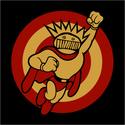|
Which version are you reading? I have the Penguin deluxe edition with the crinkly pages and the French flaps and I love it :3
|
|
|
|

|
| # ? May 7, 2024 12:34 |
|
Heath posted:Which version are you reading? I have the Penguin deluxe edition with the crinkly pages and the French flaps and I love it :3 I've got the Penguin largeish paperback with the blue cover. For a while I was reading a copy of the little mass market paperback and it was kind of impossible to read in that format.
|
|
|
|
I hate thick books in trade paperback size. I got through V. that way but I read that the Bantam one has Pynchon's later edits that aren't reproduced in newer versions.
|
|
|
|
I have the ugly Frank Miller one from 2006.
|
|
|
|
That's the one I have. I like it
|
|
|
|
I went back and read the part about the opening and how the rocket's trajectory forms a circular rainbow, but I'm having a really hard time picturing why it would appear as a circle from below. Can someone explain that? (Or better yet draw it out)
|
|
|
|
Any more entries to post, mdemone? I left my good copy at work. I just searched for an audiobook thinking there must be multiple versions, but nope...
|
|
|
|
Jesus Christ, that some of the more lewd scenes like Pudding's made me physically gag and spit out my lunch. But then again, the funny songs like Tantivy Mucker Maffick had me laughing hard. Pynchon's writing certainly makes you feel.
|
|
|
|
Alright you twisted my arm so... Episode 3 Our first visit to ACHTUNG headquarters, where Teddy Bloat is relaying his photographic findings regarding Slothrop to his superiors. This episode is therefore one long analepsis, but it's still worth noting that we are initially encountering Slothrop through the objects associated with him (not least of which is the map of his conquests, of most interest to ACHTUNG). This prefigures his fragmentation into Rocketman, and final dissolution into object instead of subject as the Slothrop character disappears from the novel in Part 4. Note that we are now firmly in the realm of hysteron proteron as a literary device, once it is established that Slothrop's somehow predicting where the V-2 rockets will fall. This will appear again and again in GR, both on large scales and in the smallest details, as a means to break the reader's confidence in the world-as-it-seems, beginning their journey into a universe where everything is always-already connected to everything else. Along these same lines, notice the radical contingency, or in light of the previous point perhaps I should say the apparent radical contingency, that is exposed here in this early action: if Pirate does not break Teddy Bloat's fall from the balcony in the very first physical act performed in the very first episode, Teddy Bloat is not available to make his report, Slothrop does not escape into the Zone, and much of the rest of the novel will fail to happen. Obviously we might imagine that much of it would and does happen anyway, despite Slothrop's flight and transformation into the Rocketman -- many of the Forces on display in GR are precisely those that cannot be broken or even affected at all by individuals, and that is of course Pynchon's point: the world operates in a way that disguises tremendous power as coincidence, rendering its destructive tendencies opaque to character and reader alike, while the merely improbable is elevated to the status of powerful mystery by the paranoid and conspiratorial...and which perspective can really claim a more objective grip on truth than the other? Notes: V17.9, B19.11, P17.24 this dripping winter noon From the eleventh until the eighteenth of December 1944, London was held in the grip of a cold fog that blew in from the south. Temperatures held in the upper thirties. “Bleak in the Streets” is how the Times described it on December 15. The afternoon of December 18, the fog broke and a cold drizzle began falling (see also V20.1-3n). One of the only solid clues that pinpoint the date of episodes 1-5. V18.8 - 38, B20.17-21.11, P18.25 -19.13 Things have fallen roughly into layers . . . a News of the World Among this list of objects on Slothrop’s desk are items, allusions, and brand names associated with him throughout the novel. He began “chain-smoking,” we are told, with the first rocket strikes (V21.22), so the flints for his Zippo brand lighter are a must. Mother Nalline would have had to mail him Thayer’s slippery elm throat lozenges because the Henry Thayer Company (formerly of Cambridge, now of Concord, Massachusetts) marketed the product only in New England. The box still stresses how a lozenge “eases smoker’s throat.” Incidentally, “Nalline” is itself the proprietary name of a pharmaceutical product, Nalorphine, once widely employed by police to test for the presence of opiates, especially heroin, in a suspect’s blood. “Johnny Doughboy Found a Rose in Ireland” (lyrics by Kay Twomey, music by Allan Roberts) was introduced in the 1942 John Auer film, Johnny Doughboy (Republic Pictures), starring Henry Wilcoxon (see also V559.11-14), and later that year the piece was a hit song for bandleader James King Kern “Kay” Kyser (1906 - 85). Slothrop will eventually give up ukulele for harmonica, but Tantivy’s comparing him to George Formby (1904 - 61), the ukulele-strumming British screen comic of the forties, may tell us something about Slothrop’s singing voice: Formby’s was a high screech. Kreml hair tonic is a bygone product, but the countless advertisements for it in American magazines from the period (see Time or Life) all stress the Lothario factor: a Kreml man was a “love-pirate,” as one ad put it, because “he always steals away the loveliest looking girls.” Some of these objects exercise a proleptic force. Among the “lost pieces to different jigsaw puzzles,” the eye of the “Weimaraner” will reappear in Ned Pointsman’s dream about a 1941 champion Weimaraner named Reichssieger von Thanatz Alpdrucken (V142.32) and then again in Alpdrücken, a film by the character Gerhardt von Göll (V395.6). Similarly, the “orange nimbus of an explosion” anticipates the news photo Slothrop finds in part 4 of the atomic bomb exploding over Hiroshima after being dropped from a B-29 (rather than a B-17) Flying Fortress referred to in this passage. The can of Nugget shoe polish anticipates the analepsis to rag-popping shoeshine boy Malcolm X, working the Roseland Ballroom lavatory in 1939 (see V63.3n), which by circuitous routes will lead to the semantic meditation on “poo poo ’n’ Shinola” (V687.5). At the end of this catalog we also glimpse Slothrop’s reading materials: pamphlets and guidebooks distributed to foreign servicemen by the British “F.O.,” or Foreign Office. Finally note that Slothrop reads the gossipy and sensationalistic London daily paper News of the World along with reports from “G-2,” or U.S. Army intelligence. V19.31-32, B22.11, P20.8 quid wager on the Blackpool-Preston North End game A “quid” is British slang for the monetary denomination of one pound sterling; the game is British football (American soccer), results of which were posted in each Monday’s Times of London, after Saturday’s matchups. Blackpool and Preston North End competed in the North League of London’s Football Association. As was customary, the two teams played each other twice, on successive weekends: on October 7, 1944, the match produced a 1-1 tie, in a game broadcast over the BBC General Forces Programme at 4:15 P.M.; the next Saturday, the fourteenth, Preston North End narrowly beat Blackpool, 1-0. The dates establish the time of Bloat’s analeptic memories in this passage. mdemone fucked around with this message at 01:31 on Aug 19, 2014 |
|
|
|
|
Just finished the part with that poor stooge Poekler and Ilse. That was really Ilse, right? Or were they actually sending fake daughters to him? That whole section was a real loving downer. mdemone posted:Alright you twisted my arm so... Sweet.
|
|
|
|
Episode 4 Notably, the first episode in which we meet Slothrop (after he visits the site of Pirate's message-rocket that same day) is almost entirely composed of flashbacks to earlier times: his childhood, his girl-adventures thus far in the war, and even his ancestral history. Note the repeated invocation of Puritan figures and perspectives as they pertain to Slothrop's lot in life and his future in the Zone. Notes: V20.21, B23.3, P21.1 a graphite cylinder Graphite is a highly heat-resistant material, which is why the V-2 rocket steering vanes were made of it, and why this cylinder has “survived” (with message intact) at this blast site. V22.3, B24.40, P22.22-23 a build out of the chorus line at the Windmill Marjorie, the second of Slothrop’s girls, could work (thinks Tantivy, assigned to bird-dog all of Slothrop’s amorous conquests for clues to his magical penis) at one of the “Non-Stop Revues” listed daily on the Times of London entertainments page. The Windmill Theatre was located on Great Windmill Street, just off Piccadilly Circle. The Windmill opened in 1931 as a venue for stage drama but poor receipts forced a turn to variety theater. “Revudeville,” begun in 1932 and evidently the first of its kind in London, spotlighted low comedy and chorus lines of Parisian-style nearly nude dancing girls, “cont. dly. 12:15 - 9:30,” according to the Times. Through the Blitz, the Windmill was the one theater that never closed, its performers often sleeping overnight during the worst bomber, V-1, and V-2 attacks. V22.24-27, B25.23-26, P23.3 - 6 “I know there is wilde love . . . of God’s owne planting” David Seed has identified this obscure passage from Thomas Hooker as deriving from a 1637 sequence of sermons, The Soules Implantation into the Natural Olive. The general context is Christian redemptive hope, in which “Adam was the old and wild Olive, Christ the true Vine, and the new Olive” (180). Fallen man must therefore be severed from his unregenerate root and grafted onto, “implanted in,” Christ; the last sermon, “Spirituall Love and Joy,” sets worldly love against the fulfillment that stems from this humbling, enlightening influence of the Divinity. Hooker (180) acknowledges mundane passion in the passage Pynchon quotes: “I know there is wilde love and joy enough in the world, as there is wilde Thyme and other herbes, but wee would have garden-love and garden-joy, of Gods own planting, for such hypocriticall love and joy we will not meddle her.” Seed’s commentary (“Thomas Hooker”) is useful: “Pynchon cuts out the dismissive comment at the end of the passage and renders Hooker’s whole distinction ironic by quoting it within such a profane context. Indeed Tyrone Slothrop, the novel’s closest candidate for protagonist, embodies two of the sins that Hooker rails against—drunkenness and adultery. V22.27-29, B25.27-29, P23.68 Teems with virgin’s-bower . . . love-in-idleness Slothrop’s mapped garden of earthly delights further ironizes Hooker’s image of the divine garden. The virgin’s bower (genus Clematis) is an American plant with white flowers; the forget-me-not (Myosotis), a European plant with clusters of small blue or purple flowers; and rue (Ruta), also known as “herb of grace,” a Eurasian plant with red flowers. Note the eastwarding progress of these three, for in a sense it summarizes “Slothrop’s [eastward] Progress” (V25.6) from the United States back to the longitudes his forefathers left behind. As for the fourth herb, love-in-idleness (Viola), Pynchon correctly identifies this common pansy, which comes in all colors, as growing “all over the place." V24.14-15, B27.25-26, P24.37 a Saint George after the fact St. George is the patron saint and romance hero of Britain. Slothrop’s dragon is the rocket, “the Beast” whose “droppings,” or exploded parts, lie scattered over the blast site; a further point is that Slothrop, no hero, arrives too late to battle it. V25.6-7, B28.21, P25.28-29 Slothrop’s Progress, London the secular city instructs him Figures Tyrone as profane pilgrim, perhaps a secular version of John Bunyan’s hero in the Puritan classic of 1678, The Pilgrim’s Progress, from this World to that which is to Come (Delivered under the Similitude of a Dream). Or, more interestingly, an expansive version of William Hogarth’s series of eight paintings (later lithographed), “The Rake’s Progress” (1733-34). As McCarron (“Pynchon and Hogarth”) first pointed out, in Hogarth’s narrative sequence his antihero Tom Rakewell, having inherited his miserly father’s slowly accumulated fortune, is seen descending from the company of gentlemen and artists, to drinking excessively among bawdy women, gambling, getting arrested for debts, marrying for money, then landing in debtor’s prison and, finally, the Bedlam madhouse. The eight guises of Tom Rakewell’s progress through secular London correspond, loosely, to Slothrop’s eight identities as he moves through London and Europe. V26.37-38, B30.25-26, P27.18-19 Death is a debt to nature due . . . so must you To Puritan ears there is heresy in Constant Slothrop’s epitaph. The debt, as Hooker and other Puritan divines would insist, is due not to nature but to God—a crucial difference. V27.4 - 6, B30.31-33, P27.23 his son Variable Slothrop . . . the nine or ten generations tumbling back Note the play of opposites, constant and variable. This is also the first of many instances of hysteron proteron: a trope of backward motion, regression, and reversals of cause and effect. Also, in a similar way Thomas Ruggles Pynchon Jr. is “nine or ten generations” removed from his ancestors, John Pynchon (1626-1702) of Springfield, Massachusetts, and William Pynchon (1590-1662), founder of Springfield and Roxbury. William was a patentee and treasurer of the Massachusetts Bay Company and author of theological treatises ruled heretical by Puritan divines. V28.26, B32.18, P29.5-6 in long rallentando The musical term signifies a gradual slowdown of tempo. In this context, another instance of hysteron proteron.
|
|
|
|
|
mdemone posted:If anyone has thoughts about Part IV (Counterforce) I would especially like to hear them, as I have struggled with thematic connections in that section of the text, throughout repeated readings. What struck me most about Part IV is how, despite the title implying some sort of reactionary element or heroic rebellion, in the end, everything just stayed about the same. Slothrop the Person doesn't matter any more to Bodine and his crew than he did to Marvy or Pointsman. Blicero simply shuffles off to the States to get another job. The War hasn't affected any real change, the same people are in power and the same engines will continue to roll forward over the poor damned Preterites who were born fated never to know what horrible things lay above them. In the end, perhaps even Pirate is still fantasizing about another famous political figure, managing his fantasies about blowing up parts of California, just as he kept everyone else in check for Them in the beginning of the book. We start in the dark, rolling forward, and we end in the dark, while a rocket lands and the film rolls to a stop. From the Pynchon Wiki: (Although it seems most likely that his name is connected to Gilbert & Sullivan's Pirates of Penzance, where the hero Frederic is "'prenticed to a pirate," it has been pointed out, by Frank Lynch, that "Pirate Prentice" is an anagram of "Preterite Panic." - In the interests of full disclosure...)
|
|
|
|
Mescal posted:Just finished the part with that poor stooge Poekler and Ilse. That was really Ilse, right? Or were they actually sending fake daughters to him? That whole section was a real loving downer.
|
|
|
|
So what happens to that hijacked U-Boat? Do they ever get to make a movie again?
|
|
|
|
A relevant link when this was the book of the month some years ago: http://forums.somethingawful.com/showthread.php?threadid=3261572 Below is a cleaned up and slightly expanded bit that I wrote (I've unspoiler'd it for readability but it contains nothing really upsetting for anyone's first read) from that discussion thread, since it pertains both to Pölker's story as well as the discussion of certain symbolism. There's some leadup for this one, so stay with me: To describe and predict a rocket's parabolic path--and really, any circular or curved kind of trajectory--while working within the familiar cartesian coordinate system, y = f(x) plotting formulas and all the rest... it gets messy. When you try to describe curves in that system you will struggle with fiddly data points and numbers, your formulas will quickly become fiendish, and it will be just plain difficult to think about a rocket's movements in terms of x and y. However, when you shift your foundation of how to represent those paths and forget about x and y to instead think in terms of angle and radius, you get the polar coordinate system. Now the plots of parabolic arcs are simpler to describe in detail, which helps with understanding and leads ultimately to mastery. So in the book, during Pölker's side story he goes over this same realization and paradigm shift that the rocket teams experienced. After shifting paradigms and mastering how to view and manipulate the rocket's arc, they could focus on perfecting their ability to predict and control it. A short while later he's out with his daughter (or whoever she really is) on one of her visits. And they're out at one of the launch fields and as a way to explain to her what these rockets do, in a very simple visual way of what he's working on, he takes his finger and makes a parabolic arc in the air in front of him. And there on the page, Pynchon references how he makes this gesture similarly to how christians sign the cross in front of themselves. Such a small reference, but wow does it unpack into quite a lot. Paradigm shifts, technological advancement, mastery of new concepts, seeing and describing the world in a new way, all capped off with a cartesian-versus-polar visual comparison, in terms of religious signs that anyone can make. One we've seen all our lives (the cross, cartesian, old, clumsy at representing newer concepts). And the other? The arc, new, expressive, powerful, fundamentally different, and the title of the damned book. But also it's curiously suggestive of the infinite (cyclical, "Infinitely Below The Earth" ) and also at the same time suggestive of the finite (death ie. what the rockets accomplish when they reach the end of the arc). The whole circular/arc thing representing at times the infinite and endless vs. the finite and fatal, to me, is really interesting. I think the comparison is that we end up taking the endless abundance of our own world and transforming it into a finite form. One example of this (no citation, going off memory sorry) is when the science of the V2 is described as first discovering the ability of a rocket, but then immediately taking its purest characteristic--to climb and escape and fly forever--and crippling it by limiting thrust and so on, so that it is instead turned into a weapon. The rocket itself is blameless, it and its abilities have been weaponized by us. A weapon that, as it happens, now takes a path along that ever-referenced arc to its path of death and ending. Another example might be this excellent quote which again suggests that we humans take a world of the supposed infinite and by our nature end up fatally corrupting it. quote:https://www.goodreads.com/quotes/257125-kekul-dreams-the-great-serpent-holding-its-own-tail-in Bhaal fucked around with this message at 01:44 on Sep 4, 2014 |
|
|
|
Bump. After a break, I'm reading it again. Only two hundred pages left. Reading it slow: a combination of only reading it during downtime at work (which there isn't much of) and because I'm savoring it. Part of me doesn't want to finish it. It's sparked my bock for writing, which I hadn't done much for a while. GR taught me you can write however you want. If you're on the fence about reading this book, do give it a shot. It has improved my life to just be in the process of reading it. I have no idea why, but it's the truth.
|
|
|
|
Guuuuys https://www.youtube.com/watch?v=wZfs22E7JmI
|
|
|
|
Been anticipating it for months. My favorite author and my favorite director come together? It's a dream come true.
|
|
|
|
At least they're not trying to make GR. I remain pessimistic anyway, although IV is the most filmable Pynchon, that doesn't mean it'll work.
|
|
|
|
|
In the NYT profile they just did on Anderson he talked about how the Zucker bros were a big influence on the movie and it looks like from the trailer he's using slapstick in place of the pretty hilarious inner-dialogue Pynchon wrote. For example: I'm pretty sure Phoenix screaming at that picture in the trailer is his reaction to the baby that was breastfed by a heroin addict. But it still looks really funny and good and I will be there with bells on opening day. I'm wondering what this "Jurassic change" Anderson made to the ending is.
|
|
|
|
Heath posted:I went back and read the part about the opening and how the rocket's trajectory forms a circular rainbow, but I'm having a really hard time picturing why it would appear as a circle from below. Can someone explain that? (Or better yet draw it out) Basically, rainbows are actually circles (as seen when you spray water in the sun) but the earth cuts off the other half of the circle. What this means for the book is up for discussion though it ties into all the other circular imagery most likely. There are pictures on the link about this: http://www.asu.edu/courses/phs208/patternsbb/PiN/rdg/rainbow/rainbow4.shtml
|
|
|
|
Just read the part where Rocketman arrives at... wherever in a rainbow pig suit. The book called him just "the pig" for a while and I was like, okay, now there's a talking pig in the book, I can live with that. Doesn't seem too out of place. Maybe it was genetically engineered and drugged into sentience by joint venture of Sandoz and IG farben...
|
|
|
|
Having some German under your belt doesn't hurt at all reading this book. In a sea of great names, I have to point one out: the poor secretary that Roger wiles out on around page 640 is named Mueller-Hochleben. Translated directly and literally, that's Miller Highlife.
|
|
|
|
Just finished a fifth readthrough and it's amazing how much more it coalesces each time - especially some of the more digressive fragments in The Counterforce. And Pynchon's prose only becomes more and more beautiful the less you have to concern yourself with cracking the plot and fitting everything together - I was noticing especially gorgeous turns of phrase that never caught my eye before.
|
|
|
|
Finished it last week. Reading the book has made my life better, thought the last parts felt like a bit of a letdown. Any advice for something to read online to fill in the blanks and help me process the whole thing?
|
|
|
|
Mescal posted:Finished it last week. Reading the book has made my life better, thought the last parts felt like a bit of a letdown. Any advice for something to read online to fill in the blanks and help me process the whole thing? Just read it again
|
|
|
|
Mescal posted:Finished it last week. Reading the book has made my life better, thought the last parts felt like a bit of a letdown. Any advice for something to read online to fill in the blanks and help me process the whole thing? When I finished it I felt like I had mostly "gotten" it but still went online to snoop around for others' thoughts. Thankfully, there's actually not much in terms of gestalt interpretation, just a lot of people reverse engineering his source texts and (auto-)biographical elements. So: blue squares posted:Just read it again Or maybe specifically the parts you feel didn't jell. I still probably need to reread the Tchitcherine section towards the middle.
|
|
|
|
blue squares posted:Just read it again Yeah, more or less. Pynchon has a real genius for nesting details throughout the narrative, the significance of which only becomes clear much later - at which point you've completely forgotten he ever mentioned them, because there's so much going on. But as you read it more and more, you start to glean how intricately interwoven the entire narrative is, the smallest characters appear in places you never noticed before. It really highlights the depths of Pynchon's treatment of paranoia. Even having read it four or five times now, there are still sections I haven't quite grasped - namely substantial portions of Tchitcherine and Enzian's stories - but each reread illuminates more and more, particularly in that final stretch, when Slothrop starts to scatter and it becomes more and more fragmented. On my first (successful) run-through, most of the last 150 or so pages were incredibly difficult to make sense of, so don't worry, it'll become clearer on future reads.
|
|
|
|
I'm in college and I'm doing extensive extra-curricular reading to prepare for grad school, so I don't feel like I really have the time to dedicate to reading a new novel. So I'm going to re-read this one. Anything I should pay particular attention to on the second time around?
|
|
|
|
Question. What's the book saying or trying to say about paranoia and They? My impression was that the many conspiring groups never added up to any real They to speak of, and paranoia (though reasonable in the story) is just what folks' brains come up with from living in a world that doesn't make sense.
|
|
|
|
There sort of is a unified They out to get Slothrop though. The "They" being Slothrop's antagonists. He sees everything as connected because it is, to not see the connections would be to deny his own existence as part of what connects the They to each other. This sort of ties in to the paranoia/anti-paranoia thing, the comforting, religious nature of the belief that there is some master plan and it's not all just endless coincidences. For Slothrop this manifests as a sort of messiah thing, he ties They together, he is an integral part of the plan simply by being the target of it, and as the book goes on he becomes more and more this crazy Racketmensch hero, becoming what everyone is looking for, completely justifying his paranoia and in so doing giving his existence meaning.
|
|
|
|
I've been steadily reading this for a few weeks now, third attempt, this time I plan on finishing. I'm on page 112 of the Penguin Deluxe Edition (I love the Frank Miller cover, but I wish I could find a good source on the mistakes in this edition so I could fix them all). I'm a slow reader and I have ADHD, so this book is a conflict of interest. The Crying of Lot 49 and Inherent Vice are in my top favorite books of all-time, V. was great, but this is a whole new ball game. I'm enamored by the language, but my thoughts get cluttered easily. However, I found this handy guide to keep track of the actual events of the book without spoiling anything. Having a fun time reading it, but the words are like waves crashing against my head. The most fun I've been baffled since the first time I smoked weed.
|
|
|
|
Franchescanado posted:I've been steadily reading this for a few weeks now, third attempt, this time I plan on finishing. I'm on page 112 of the Penguin Deluxe Edition (I love the Frank Miller cover, but I wish I could find a good source on the mistakes in this edition so I could fix them all). I read that guide along with GR as well and it was an enormous help. I don't know how many times I would finish a chapter and read the summary and then be like "Ohhhh that was just a dream sequence, that makes a lot more sense" or realized what was actually happening.
|
|
|
|
During the discussion of hilarious moments, I don't recall anyone mentioning the scene with Slothrop tries different British candies, each of them worse than the other, but hiding his nausea to be polite. It even had a callback to the "sadistic British tradition" of naming foods with a "Surprise", one being, I think, chocolate nougat with mayonnaise filling. Such a simple scene, but I was laughing like a lunatic.
|
|
|
|
I just read The Crying of Lot 49 and it's pretty bad. It did have the very good line "I had to use the little boys' room, because the men's room was full."
|
|
|
|
What did you not like about it?
|
|
|
|
Mescal posted:I just read The Crying of Lot 49 and it's pretty bad. It did have the very good line "I had to use the little boys' room, because the men's room was full." if you did not laugh during the hotel room scene you have no soul
|
|
|
|
I would call 49 stylistically influential, but I haven't re-read it in years. It's certainly the weakest of the California novels, which is only to be expected from such an early work. Vineland does a much better job of wrapping similar themes into a good story.
|
|
|
|
|
How's the paperback for Bleeding Edge? Big margins, nicely typeset?
|
|
|
|

|
| # ? May 7, 2024 12:34 |
|
The more and more I work for the DoD, the less and less I am surprised by the absurdity of the stuff in this book. Taxpayer money goes into some really weird poo poo.
|
|
|
























